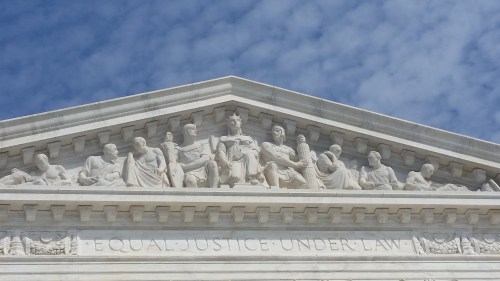
Judge Brett Kavanaugh currently serves on the second most powerful court in the country: the D.C. Circuit. Since 2006, Kavanaugh has served as the intellectual center of the D.C. Circuit’s conservative wing. This record of jurisprudence has set Kavanaugh to replace the Justice he once clerked for: Justice Kennedy.
Vital Statistics
Name: Brett Michael Kavanaugh
Age: 53
Current Position: Judge on the U.S. Court of Appeals for the D.C. Circuit (since 2006)
Education: B.A. from Yale; J.D. from Yale Law School
Clerkships: Judge Walter Stapleton, U.S. Court of Appeals for the Third Circuit; Judge Alex Kozinski, U.S. Court of Appeals for the Ninth Circuit; Justice Anthony Kennedy, U.S. Supreme Court.
Prior Experience: Solicitor General’s Office, Department of Justice; Associate Independent Counsel, Whitewater Investigation; Private Practice; Associate Counsel and Assistant to the President for President George W. Bush
Jurisprudence
Kavanaugh has served on the U.S. Court of Appeals for the D.C. Circuit since 2006. During his twelve years on the court, Kavanaugh has authored approximately 270 majority opinions, concurrences, and dissents. These opinions generally establish Kavanaugh as one of the most conservative judges on the court.
Given the D.C. Circuit’s jurisdiction over many administrative law cases, Kavanaugh has written extensively in evaluating agency regulations and decisions. For example, after a panel of the D.C. Circuit upheld net neutrality regulations passed by the Federal Communications Commission, Kavanaugh dissented from denial of rehearing en banc, arguing that net neutrality violated both Congress’ grant of power to the agency and the First Amendment. See United States Telecom Ass’n v. Fed. Commc’ns Comm’n, 855 F.3d 381, 417 (D.C. Cir. 2017). In another case, Kavanaugh found that the Environmental Protection Agency was statutorily required to consider the costs of emission control in issuing regulations. White Stallion Energy Cntr. LLC v. EPA, 748 F.3d 1222, 1259 (D.C. 2014). This holding was ultimately affirmed by the Supreme Court. Michigan v. EPA, 135 S. Ct. 2699, 192 L. Ed. 2d 674 (2015).
In other cases Kavanaugh:
- Dissented from a ruling requiring an immigrant minor who sought access to an abortion to be provided one. Garza v. Hargan, 874 F.3d 735, 755 (D.C. Cir. 2017), cert. granted, judgment vacated sub nom. Azar v. Garza, 138 S. Ct. 1790 (2018).
- Dissented from denial of en banc rehearing of a decision upholding a requirement that religious organizations not wishing to provide contraceptive coverage for employees participate in the opt out process. Priests for Life v. U.S. Dep’t of Health & Human Servs., 808 F.3d 1, 14 (D.C. Cir. 2015).
- Ruled that the structure of the Consumer Financial Protection Bureau (CFPB), which required the President to have cause before dismissing the head, was unconstitutional. PHH Corp. v. Consumer Fin. Prot. Bureau, 881 F.3d 75, 165 (D.C. Cir. 2018). This ruling was overturned by the D.C. Circuit en banc. 881 F.3d 75 (D.C. Cir. 2018).
- Held that the Anti-Injunction Act barred plaintiffs from challenging the individual mandate of the Affordable Care Act. Seven-Sky v. Holder, 661 F.3d 1 (D.C. Cir. 2011).
- Held the Affordable Care Act did not violate the Origination Clause of the Constitution. Sissel v. U.S. Dep’t of Health & Human Servs., 799 F.3d 1035, 1049 (D.C. Cir. 2015).
Why Trump Could Choose Kavanaugh as His Nominee
Trump has indicated that he is looking for a nominee with Ivy League credentials and a strong academic record. Kavanaugh ticks off both boxes. Furthermore, Kavanaugh is generally strongly regarded as a judge and has developed a solidly conservative record on the D.C. Circuit.
Additionally, White House Counsel Don McGahn is particularly focused on Administrative Law when selecting judges. Specifically, McGahn is looking for judges who oppose deference to administrative agencies and prefer a greater degree of judicial involvement in judging agency policy. Kavanaugh’s record, more than that of any other shortlister, reflects this hostility to agency deference.
Why Trump Would Not Choose Kavanaugh as His Nominee
Kavanaugh is already facing a lot of pushback from social conservatives, who argue that his record shows an insufficient commitment to overturning Roe v. Wade. Additionally, some senators have pushed back regarding Kavanaugh’s opinion in the Affordable Care Act cases, arguing that Kavanaugh failed to overturn the Act when he had a chance.
Expected Lines of Attack
While Kavanaugh is currently facing criticism from social conservatives, it is unlikely that such criticism would continue in a sustained fashion if he was selected as the nominee. Rather, if nominated, Kavanaugh is more likely to face criticism from the left, who will criticize his willingness to overturn regulations (that they would argue are) needed to protect health and safety. Kavanaugh may also be attacked for his work as part of the Whitewater Investigation, in the Bush Administration, and for writings on executive power and authority.
Likelihood of Nomination
Kavanaugh is likely the preferred candidate of White House Counsel Don McGahn. In general, he is a candidate who is likely to unite the Republican caucus and has the best chance (of the current shortlisters) of securing Democratic support. As such, despite the social conservative pushback, I expect Kavanaugh to be a strong contender for the nomination.
Pingback: Confessions of ennui re tonight’s Supreme Court announcement « Jeremy Buchman
Pingback: Trump Picks Kavanaugh - Daily Callout
Pingback: Trump Picks Kavanaugh | Real Patriot News
Pingback: Trump Picks Kavanaugh - Novus Vero
Pingback: VIDEO Trump Picks Kavanaugh – staunch gun-rights defense – McConnell Mocks Left’s Rhetoric Against Pick | Reclaim Our Republic
Pingback: Tues 7/17: Today’s pop quiz: “Conscious tool” or “Useful Idiot”? Pick one. – INDIVISIBLE VENTURA
Pingback: Judge Karin Immergut – Nominee to the U.S. District Court for the District of Oregon | The Vetting Room
Pingback: Judge Daniel Calabretta – Nominee to the U.S. District Court for the Eastern District of California | The Vetting Room